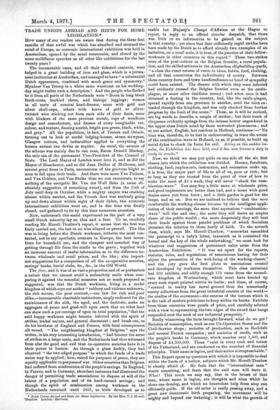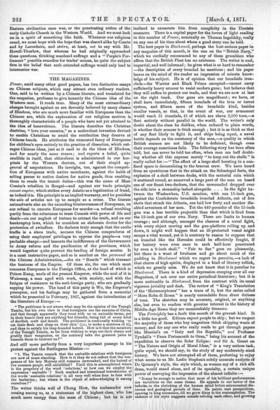TRADE UNIONS ABROAD AND HINTS FOR HOME LEGISLATION.* How many
of our readers are aware that during the three first months of that awful war which has absorbed and strained the mind of Europe, an economic international exhibition was held in Amsterdam, opened by the usual ceremonies, and closed by the same mellifluous speeches as all other like exhibitions for the last twenty years ?
The innumerable cases, and all their ticketed contents, were lodged in a great building of iron and glass, which is a perma- nent institution at Amsterdam, and managed to have " a substantial Dutch appearance, combined with much grace and symmetry." Mynheer Van Tromp in a white satin waistcoat on his wedding- (lay might realize such a description ! And the people who flocked Lo it from all parts of the Netherlands were "Boors iii long black frock-coats, buckled shoes, and bishops' leggings ; women in all sorts of comical head-dresses, some with gold and silver skull-caps, others with horns of gold or silver- twisted wire sticking out from each side of their faces, some with blinkers of the same precious metals, caps of wondrous design and manufacture, and dresses of every imaginable cut, colour, and texture, flaming scarlet, bright pea-green, black, white, .and grey." All the population, in fact, of Teniers and (Made, turning out to look at model lodging-houses, steam stewpans, Glasgow cottons, and indiarubber applied to everything the human animal can devise or require. As usual, the success of the scheme was mainly due to one man, Baron Donald Mackay, the only son of the permanent Vice-President of the Council of State. The Lord Mayor of London went into it, and so did the Mayor of Manchester, and so did Jean Dolf us of Mulhouse, and several great firms in Paris, unconscious of the grievous blight so soon to fall upon their trade. And there were more Van Puttens, and Van Gelders, and Van Stolks than we can enumerate, to say nothing of the energetic Mr. Van der Wall Bake (a name ob- stinately suggestive of something sweet), and from the 15th of July until deep in October, while a mighty empire was crashing almost within earshot, and the French fleet was aimlessly going -up and down almost within sight of their dykes, this economic international exhibition went on, and in due time was finally closed, and gathered to its by this time numerous ancestors.
Now, underneath this social experiment on the part of a very small Dutch minority lay an idea and a fear. To us, carefully reading Mr. Hovell-Thurlow's report, it seems that the first was fairly carried out, the last in no wise allayed or proved. The idea was to bring before the Dutch workman, hitherto the most con- tented, not to say apathetic creature in Europe, the best inven- tions for household use, and the cheapest and soundest way of getting through life from the cradle to the grave ; together with An immense amount of useful information as to the difference be- tween wholesale and retail prices, and the like ; also import- ant suggestions for a comparison of all the co-operative societies, savings' banks, burial clubs, &c., &c., in the Old World.
The fear, and it was of so vast a proportion and of so portentous .a nature that we cannot avoid a melancholy smile when com- paring it against the remedial measures not so much proposed as suggested, was that the Dutch workman, living in a model kingdom of which says our author" robbery and violence unknown, the rich secure, the poor content,—one law for rich and poor alike,—innumerable charitable institutions, amply endowed for the maintenance of the sick, the aged, and the destitute, make an aggregate of peace and good-will upon earth that no other land can show such a per-centage of upon its total population," that the said happy workman might become infected with the spirit of .strikes, trades unions, and general discontent ; and break out, as do his brethren of England and France, with fatal consequences .all round. "The neighbouring kingdom of Belgium" says the writer, in his very interesting introduction, "had become the scene of strikes on a large scale, and the Netherlands had thus witnessed 'from afar the good and evil that co-operative societies have it in their power to bestow. As through a glass darkly, they had observed "the two-edged purpose" to which the funds of a trade union may be applied ; how, raised for purposes of peace, they are equally applicable to purposes of war. Other countries than Belgium had suffered from misdirection of the people's savings. In England, in France, and in Germany, abundant instances had illustrated the danger of permitting trade associations to dispose at will of the iabour of a population and of its hard-earned savings ; and -though the spirit of combination among workmen in the Netherlands remained until 1857, so little developed as to
• Trade Unions Abroad and Hints for Home Legislation. By the Hon. 1'. J. Hoven- "Thurlovr. London: Harrison. enable her Majesty's Charge d'Affaires at the Hague to report, in reply to an official circular despatch, that there was little or no information to be gained on the subject in that country ; yet since that date sufficiently rapid strides have been made by the Dutch as to afford already two examples of an imitation, on a small scale, it is true, of the practice of their fellow- workmen in other countries in this regard." These two strikes were of the peat-cutters on the Belgian frontier, a rural popula- tion, and the skilled artizans in the Amsterdam shipbuilding-yards, "a class the exact reverse of rustic in ideas, habits, food, clothing, and all that constitutes the individuality of society. Between these country-born and town handicraftsmen no bond of sympathy could have existed. The disease with which they were infected had evidently crossed the Belgian frontier even as the cattle.. plague, or some other insidious enemy ; and when once it had obtained a footing in the country, had, like the cattle-plague, spread rapidly from one province to another, until the taint ex- tended through the kingdom, and was only checked from further progress by the limit of the ocean." These, as it will be noticed, are big words to describe a couple of strikes ; but their touch of eloquence evidently springs from the intense horror engendered in the upper-class Dutch mind by these unwonted phenomena ; and so our author, English, but resident in Holland, continues :—" No time was, therefore, to be lost in endeavouring to trace the action of the combination-wave in Holland, so. as, if possible, to build up social dykes to check its force for evil. Acting on this sudden im- pulse, the Exhibition has been held, and it has now become a duty to study its results."
Now, we think we may put quite on one side all the six first classes into which the exhibition was divided. Houses, furniture, clothing, food, implements, instruction, and recreation make up, it is true, the major part of life to all of us, poor or rich ; but so long as they are treated from the point of view of how to make the most of 11 a week, they will never " check the com- bination-wave." You may buy a little more at wholesale price, and good implements are better than bad, and a home with good drains saves you from fever ; and a little garden is good for the lungs, and so on. But we are inclined to believe that the more comfortable the working-classes become by the intelligent appli- cation of their earnings, the more that mysterious " combination- wave " will rise and rise ; the more they will desire an ampler share of the public wealth ; the more desperately they will beat their heads against those painful problems of which Socialism promises the solution to those hardy of faith. To the seventh
class, which, says Mr. Hovell-Thurlow, "somewhat resembled the postscript to a lady's letter, inasmuch as it contained the kernel and the key of the whole undertaking," we must look for whatever real suggestions of permanent value arose from the Amsterdam Exhibition. " It was set apart for the reports, statutes, rules, and regulations of associations having for their object the promotion of the well-being of the working-classes," and the jury gave the first place to associations created and developed by workmen themselves. This class contained but 303 exhibits, and oddly enough 170 came from the second- rate kingdom of Wiirtemburg, which must have hunted up every such report printed within its limits ; and these, of course, "covered in reality less moral ground than the numerically scanty collections from the great industrial centres of the world— the cradles of the movement—the sources of the torrent which it is the task of modern politicians to keep within its banks. Exhibits from these countries were pearls of price, and carefully selected with a view to representing the two edges of the sword that hangs suspended over the neck of our industrial prosperity."
Really winnowing the facts brought forward, what do we get ? Societies of consumption, such as our Co-Operative Stores and the Civil-Service shops ; societies of production, such as Rochdale and several French companies ; and societies of credit, such as the people's banks in Germany, which number over 1,500, and dispose of /4,500,000. These "exist in every nook and corner of the Fatherland, and are conducted on the soundest of financial principles. Their name is legion, and their action is irreproachable."
This Report opens up questions with which it is impossible to deal within the limits of a review, subjects which Mr. Hovell-Thurlow is clearly afraid of. He feels that the "international man" wants something, and fears that the said man will have it. What? This much we may say, that in the breast of that man, whose name is legion, are thoughts and aims which he alone can develop, and which no benevolent help from atop can efficiently guide. If the old order is really passing away, and a great new democratic birth preparing, the movement will be mighty and beyond our tinkering ; it will be what the growth of Eastern civilization once was, or the penetrating action of the early Catholic Church in the Western World. And we must look on in a spirit of something like faith. Whatever our religious creed, we must hope with the hope that was shared alike by Comte and by Lacordaire, and strive, at least, not to say with Mr. Hovell-Thurlow, that whereas he had originally approached these questions, thinking manhood suffrage and a "People's Par- liament" possible remedies for trades' unions, he quits the subject firm in the belief that such extended suffrage would only lead to internecine war.



































 Previous page
Previous page